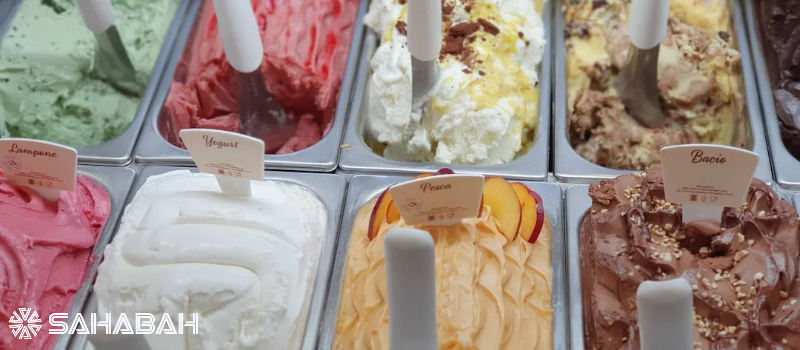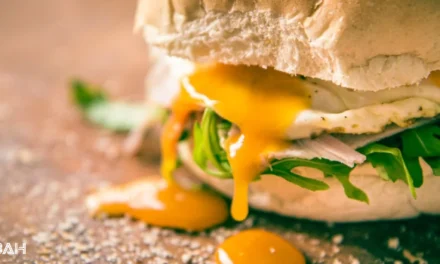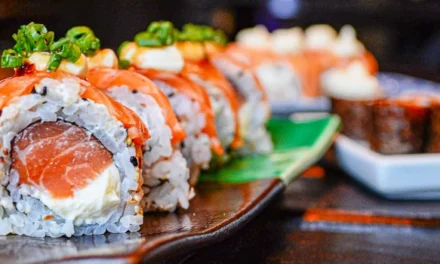Dairy Queen (DQ) is an iconic fast food chain known for its soft serve ice cream and signature Blizzard frozen treats. With over 7,000 locations worldwide, it has become a popular dining choice for many. However, for Muslims and other followers of halal dietary guidelines, the question often arises – is Dairy Queen halal?
What is Dairy Queen Products Halal Status?
Dairy Queen itself does not have an official chainwide halal certification. Halal refers to food that has been prepared according to Islamic law and traditions – including restrictions on certain ingredients and specific slaughtering methods. Halal certification ensures food is permissible and aligns with Muslim religious standards for consumption.
Understanding Dairy Queen’s Approach to Halal Certification
While the corporate Dairy Queen brand does not possess blanket halal certification across all global locations, some individual DQ franchise outlets have obtained certification independently. An estimated 106 Dairy Queen brazier franchises in the United States are certified halal as of 2023, accounting for a small but growing subset of establishments.
The fact that over 100 DQ branches across America have achieved full halal compliant status indicates that certification is indeed possible within the brand. However, it relies upon each restaurant owner taking individual initiative rather than following centralized protocols. This means halal certification status can vary significantly depending on the specific Dairy Queen restaurant a Muslim customer visits within their community. Customers looking for definitive halal compliant menu options need to check directly with their nearby DQ locations to understand their certification status.
Analyzing Menu Items Often Considered Halal at Dairy Queen
Despite the current lack of universal halal certification across all DQ chains, many standard menu items at Dairy Queen may align with Islamic dietary regulations nonetheless.
Dairy Queen’s classic soft serve recipe, for instance, tends to be halal friendly at certified and non-certified locations alike. DQ soft serve relies on milk and cream for its ingredients, avoiding meat byproducts or alcohol products that would violate religious standards. The same applies to Dairy Queen’s signature Blizzard menu – blended treats made with Oreo, Snickers, or fudge cookie dough bases steer clear of any haram ingredients.
Other potentially halal compliant menu items found at many DQ franchises include:
Dairy and Desserts:
- Soft serve ice cream
- Milkshakes
- Blizzard frozen desserts
- Ice cream cakes
Sides:
- French fries
- Hash browns
- Onion rings
Drinks:
- Coca-Cola Classic
- Sprite
- Hi-C Orange
Essentially, vegetarian appetizers and desserts prepared without traces of pork or alcohol have the highest likelihood of technically meeting halal food standards at DQ – even at non-certified individual franchises. The use of beef tallow for frying items like fries does introduce some ambiguity depending on the scholar one references, where opinions diverge on permissibility.
Do Any Dairy Queen Food Offerings Have Official Halal Certification?
Given the decentralized franchise model where locations can source ingredients independently, Dairy Queen as an overarching brand does not expressly confirm universal halal certification status for all food products across the board. However, some individual DQ outlets do advertise having entirely halal compliant menus inspected by third parties. This falls short of chain wide verification, but provides options for Muslim patrons in select areas.
Essentially, independent Dairy Queen restaurant franchise owners have autonomy when it comes to establishing supply chains for meat, produce, and other ingredients. One DQ restaurant may serve only halal chicken and fries, while another a few towns over relies on conventional distributors. Halal status is variable depending on franchise ownership and geography. This makes blanket determinations difficult on a national or global scale.
How Muslims Can Navigate Their Dairy Queen Order
With so much variation between DQ locations, how can observant Muslims know what menu items they can safely consume during visits? The most reliable verification tactic involves direct conversational inquiry with the restaurant one plans to patronize in their community.
Politely ask the cashier or manager on duty whether the location serves certified halal food options in general. You can also request specifics on products like chicken strips or burger patties – asking targeted questions like “Where do you source your chicken and beef from? Is it from halal certified suppliers?” Goes a long way.
Further helpful Arabic phrases and halal-related questions to use when ordering food include:
- “Hāl taqudīmun khiyārāt ḥilāl?” aka “Do you serve halal menu options?” in Arabic
- “Hal ta’am al-djāj halāl mu’tamad?” aka “Are your chicken strips from a certified halal source?”
- “Hal tuṭbakh bi-istikhdām al-khamr?” aka “Do you cook using alcohol products like wine or rum?”
Bear in mind – if a cashier seems unsure of ingredients or halal compliance details, politely request to speak directly with the restaurant’s kitchen manager to get clarity. On-site cooks will typically know precise details on food prep methods, ingredients in marinades, etc.
Be aware that some Dairy Queen franchises advertise themselves as “Muslim friendly” or “halal friendly” restaurants. However, this informal language does not guarantee fully halal compliant protocols across the entire supply chain. Thus confirming specifics on supplier slaughtering methods and alcohol usage remains critical regardless of an establishment’s overtures towards Muslim diets.
When in doubt, calling the displayed customer contact number or inquiring through the DQ website before visiting can help set determinations as well.
Halal or Haram: How Do Islamic Perspectives Regard Non-Certified Foods?
With so much granular variance between individual DQ restaurant approaches, what menu items can observant Muslims safely consume at uncertified branches according to theology? Leading Islamic scholars differ somewhat on this issue based on branch and interpretation – making universal consensus difficult.
Some ultra-conservative theological perspectives argue Muslims should refrain from patronizing any restaurant unable to provide explicit halal certification guarantees. For them, consuming non-certified fast food would automatically constitute haram or religiously forbidden behavior.
However, more moderate schools of Islamic jurisprudence acknowledge the practical difficulties pious Muslims face when living or traveling in non-Muslim majority countries. With few fully verified halal options, they tend to permit patronizing non-certified dining establishments so long as patrons order items aligned with general halal principles – even sans certification.
Of course, liberal theological positions also exist that offer greatest flexibility for Muslims navigating non-halal environments. But examining centrist mainstream guidance provides a balanced insight.
Can Muslims Consume Dairy Queen’s Ice Cream and Soft Serve Treats?
When it comes to Dairy Queen’s classic frozen dessert offerings, relying on time-tested recipes historically centered on milk and cream bodes well for inherent halal permissibility – certification notwithstanding. According to the principles many Islamic scholars espouse, DQ’s soft serve custard style ice cream and signature Blizzard mixer treats avoid haram taboos, meaning they should be permissible for observant Muslims seeking to balance faith in less accommodating environments.
The same would apply to Dairy Queen milkshakes, sundaes, dipped cones, and other ice cream novelties. So long as they focus on traditionally dairy-based formulas without traces of alcohol or byproducts excluded by religious decrees, these items likely fulfill moderate halal-conscious religious obligations.
How Do Islamic Authorities View Dairy Queen’s Chicken Offerings?
Poultry offerings represent more ambiguous determinations, however. Compared to straightforward ice cream products relying on acceptably halal bases like milk or cream, verifying specific details on chicken preparation proves challenging without documented halal inspection protocols.
Unlike vegetable sides or frosty Blizzard desserts, confidently declaring processed chicken offerings completely halal essentially requires confirmed compliance from suppliers – hence the need for location-specific halal governance Muslim patrons rightfully seek out through inquiries.
To play things safe religiously when Dairy Queen halal certification remains unable to be officially confirmed, avoidance of non-verified chicken meals altogether seems prudent for Muslims adhering to consensus theology on permitted foods.
Of course, situations inevitably arise where practicable avoidance proves difficult, such as traveling through regions devoid of Muslim accommodation. Within reason, educated rulings allow for some flexibility on levels of halal purity depending on circumstance. But in an ideal world, transparent certified verification holds clear advantages.
Which Common Dairy Queen Menu Items Raise Fewer Halal Issues?
Blanketing any restaurant’s full suite of offerings as absolutely off-limits or wholly permissible proves problematic without transparent halal compliance processes confirmed publicly. Nuance exists – some menu categories carry intrinsically lower risks than others when tracing supply chains. By analyzing common DQ offerings, useful context takes shape on appropriate religious precautions.
How Do Leading Islamic Institutions View Meat Products at Dairy Queen?
Dairy Queen as a fast food brand makes no universal assurances its meat ingredients stem from certified slaughterhouses adhering to specific Islamic protocols. DQ simply lacks a uniform nation or worldwide policy affirming externally audited halal verification checks across franchises. Nor does the parent company enforce established supply chain standards for incoming proteins such as beef or chicken.
Thus, any meat dishes served at Dairy Queen – including patron favorites like hamburgers, chicken strip baskets, or hot dog smoothies – should be considered of indeterminate halal status outside of certified locations. Without transparent tracing from accredited slaughter plants, Muslims observers would be wise to politely avoid such menu items altogether outside of verified restaurants, consistent with prevailing fatwas.
Can Muslims Enjoy Dairy Queen’s French Fries and Non-Meat Items?
Unlike the ambiguity surrounding protein offerings at uncertified DQ branches, many American favorites like fries or Coca-Cola require less scrutiny over precise halal standards. Strict vegetarian sides including DQ’s signature fries, onion rings, and hash browns employ largely conventional vegetable cooking oil for preparation (whether soy, corn, canola, etc). These items tend to avoid direct alcohol or any byproduct considered haram under mainstream decrees.
Of course, the use of beef tallow specifically for frying does raise theological questions for certain Islamic legal schools – variations exist on levels of permissibility. But generally speaking fried side dishes, ice cream desserts, and cold beverages tend to comply with moderate halal integrity standards at most franchises – even sans “official” paperwork declaring so. Dishes without traces of meat or alcohol provide options observant Muslims can reasonably partake in when certified halal dining proves scarce.
Summary: Key Takeaways on Navigating Dairy Queen’s Halal Status
Given Dairy Queen’s decentralized franchise approach to menus and ingredients, those wanting 100% guaranteed halal offerings must seek branches expressly adhering to formal inspection standards by sanctioned auditing organizations. Verified compliance remains the sole route for unequivocal theological confidence.
However, at non-certified DQ locations, responsible practical guidance gets conveyed as well under qualified Islamic teachings. Seeking menu items that align as much as feasibly possible with general halal eating traditions allows for cultural integration where warranted. Many sides, desserts and beverages tend to shun suspect ingredients outright.
Select DQ menu items like soft serve sundaes or packaged snacks (minus mystery meat) suggest potentially permissible paths for halal consumers lacking clear-cut alternatives. Of course, individual determination with God remains paramount depending on personal levels of stringency.
In essence, responsible religious fulfillment while navigating modern societies demands nuance. And following socially-adjusted spiritual advice on halal eating when options stay scarce enriches lives substantially versus disengaging outright from society. By better understanding Dairy Queen’s fiercely independent franchise model through proper research, adaptable Muslims can determine smart recourses that uphold both religious and community bonds where possible.
Frequently Asked Questions: Is Dairy Queen Halal?
Dairy Queen is not certified halal, and they do not exclusively serve halal food. However, some Dairy Queen locations may offer halal food options.
Does Dairy Queen offer halal products?
Dairy Queen does not have a certified halal menu, but some of their products may contain ingredients that are considered halal. It is recommended to inquire at the specific location for details about halal food options.
Are there any halal food items at Dairy Queen?
Some Dairy Queen locations may offer food items that are considered halal. Customers are advised to check with the individual Dairy Queen outlets for information about specific halal food options.
Does Dairy Queen serve halal meat?
While Dairy Queen does not exclusively serve halal meat, some locations may offer halal meat options. It is best to inquire about halal meat availability at the specific Dairy Queen outlet.
Are Dairy Queen’s soft-serve ice cream products halal?
The status of Dairy Queen’s soft-serve ice cream products as halal may vary by location. Customers seeking halal options should verify the halal status of specific products at their local Dairy Queen outlet.
Does Dairy Queen have halal chicken options?
Some Dairy Queen locations may offer halal chicken options, but it is essential to confirm the availability and certification of halal chicken at the specific outlet.
How can I find Dairy Queen stores that only serve halal food?
Currently, Dairy Queen does not exclusively operate stores that serve only halal food. Customers looking for halal food options at Dairy Queen should inquire at individual locations for information about specific halal food offerings.
Will Dairy Queen have an entirely halal-certified menu by 2023?
There is currently no official announcement or indication that Dairy Queen will have an entirely halal-certified menu by 2023. Customers interested in halal options should check with Dairy Queen for any future updates regarding halal food offerings.
Are there alcohol-free food options at Dairy Queen?
Yes, Dairy Queen offers food items that are free from alcohol. Customers can enjoy a range of food options at Dairy Queen without concern for alcohol content.
How can I determine if a specific Dairy Queen location offers halal food?
To find out if a particular Dairy Queen location offers halal food, it is best to directly contact the outlet and inquire about their current menu offerings and any available halal options.





